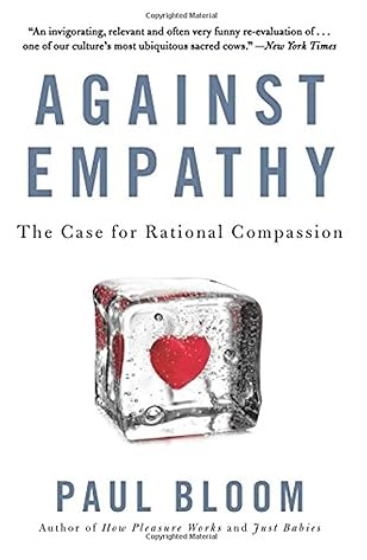Author: Paul Bloom
“Against Empathy: The Case for Rational Compassion” by Paul Bloom is a thought-provoking book that challenges the widely held belief that empathy is essential for moral decision-making and compassionate action. Here’s a detailed summary and some reviews of the book:
Summary
Main Argument:
Paul Bloom, a psychologist at Yale University, argues that empathy, defined as the ability to feel and share the emotions of others, is biased, irrational, and often leads to poor moral judgments. Instead, he advocates for what he calls “rational compassion,” which involves understanding and caring for others without necessarily sharing their emotions¹².
Key Points:
1. Empathy is Biased and Selective:
- Bloom explains that empathy is inherently biased because it is easier to empathize with people who are similar to us or who are physically close to us. This selectivity can lead to unfair and unequal treatment of others¹².
2. Empathy Can Cloud Judgment:
- Emotional responses driven by empathy can lead to decisions that are not always in the best interest of the greater good. For example, empathy can cause us to focus on individual cases rather than broader issues, leading to less effective solutions¹².
3. Rational Compassion:
- Bloom proposes rational compassion as an alternative to empathy. This approach involves using reason and logic to understand and address the needs of others, which can lead to more fair and effective outcomes¹².
Examples and Research:
Bloom supports his arguments with various examples and research studies. He discusses how empathy can lead to biased charitable donations, ineffective public policies, and even personal decisions that are not in our best interest¹².
Reviews
Positive Reviews:
- Many readers appreciate Bloom’s bold and counterintuitive arguments. They find his critique of empathy to be well-researched and thought-provoking. The book is praised for challenging conventional wisdom and encouraging readers to think more critically about their emotional responses¹².
- Reviewers also commend Bloom for his clear writing style and ability to present complex psychological concepts in an accessible manner¹².
Critical Reviews:
- Some critics argue that Bloom’s dismissal of empathy is too extreme. They believe that empathy still plays a crucial role in human relationships and moral development, and that it should not be entirely replaced by rational compassion¹².
- Others feel that while Bloom makes valid points, he does not fully address how rational compassion can be practically implemented in everyday life¹².
Overall, “Against Empathy” is a compelling read that offers a fresh perspective on the role of emotions in moral decision-making. It encourages readers to consider the limitations of empathy and to explore more rational approaches to compassion and kindness.
Source:
(1) Against Empathy Summary by Paul Bloom – Four Minute Books. https://fourminutebooks.com/against-empathy-summary/.
(2) Against Empathy By Paul Bloom Book Summary. https://www.nonfictionsummary.com/book-summary/against-empathy-by-paul-bloom/.
(3) Book Summary Against Empathy , by Paul Bloom – Shortform. https://bing.com/search?q=detailed+summary+and+reviews+of+the+book+Against+Empathy.
(4) Book Summary Against Empathy , by Paul Bloom – Shortform. https://www.shortform.com/summary/against-empathy-summary-paul-bloom.
(5) Against Empathy Summary of Key Ideas and Review – Blinkist. https://www.blinkist.com/en/books/against-empathy-en.
(6) Against Empathy: The Case for Rational Compassion. https://www.goodreads.com/book/show/29100194-against-empathy.
(7) goodreads.com. https://www.goodreads.com/book/show/29100194-against-empathy.


Leave a Reply